Bonsai scissors are a must-have for anyone into bonsai trees. There’s a variety of scissors out there, each suited for different tree sizes. If you’re on the hunt for a solid pair of bonsai scissors or pruning shears that won’t break the bank, you’re in the right place.
As a bonsai lover, you know how important pruning is for your tree’s health. It’s not just important, it’s an art that takes time and practice to get right. The right tools make all the difference. They help you trim your tree without causing extra wounds or scars. These injuries can harm the tree’s health and mess with the look you’re going for.
You’ve put a lot into this hobby, both time and money. It makes sense to invest in the best tools you can afford. This guide will help you find the top bonsai scissors for pruning and show you how to pick the perfect pair for your needs.
- Related article: Grow and Care for Bonsais
4 Key Takeaways on the Best Bonsai Scissors
- Choosing the right bonsai scissors involves considering factors such as size, material, and intended use to match the needs of your bonsai.
- Different types of bonsai scissors include concave cutters for clean branch removal, de-candling scissors for precise trimming, bud shears for fine work, and root scissors for root management.
- Stainless steel scissors are durable and rust-resistant, while carbon steel scissors offer superior sharpness but require more maintenance to prevent rust.
- Investing in high-quality bonsai scissors can improve your pruning results and protect both the tree and the tools from damage.
The 7 Best Bonsai Scissors for Pruning
Pruning bonsai trees is key to their growth and beauty. To do this well, you need the right tools. A good pair of bonsai scissors makes all the difference. They help you shape your tree and keep it healthy. Choosing the best scissors is the first step in caring for your bonsai.
1. Wazakura Yasugi Steel Satsuki Bonsai Scissors
The Wazakura Yasugi Steel Satsuki Bonsai Scissors are a standout choice for bonsai enthusiasts. Made in Japan, these 7-inch scissors are crafted from high-quality Yasugi steel, known for its durability and sharpness.
- Blade Material – Yasugi Steel
- Length – 7 inches (180 mm)
- Weight – Lightweight design
- Handle Type – Ergonomic for comfort
2. VISEMAN Japanese Bonsai Pruning Scissors
The VISEMAN Japanese Bonsai Pruning Scissors offer an excellent balance of quality and affordability. These scissors feature a traditional KinTakashi design, making them perfect for both novice and experienced bonsai caretakers.
The 9-inch length provides ample reach for bonsai trees with larger branches, while the sharp blades ensure clean cuts. Many users highlight their effectiveness in shaping and maintaining bonsai trees.
- Length – 9 inches
- Blade Type – Bypass for clean cuts
- Material – High-carbon steel
- Weight – Sturdy yet lightweight
- Design – Traditional Japanese craftsmanship
3. Lackingone Professional Bonsai Scissors
For those seeking versatility, the Lackingone Professional Bonsai Scissors are an excellent option. Measuring 7.3 inches, these scissors are designed for both bonsai pruning and flower arrangement.
Their sharp, stainless steel blades provide precision and durability, making them suitable for various gardening tasks. Bonsai owners appreciate the comfortable grip and lightweight design, which allows for extended use without fatigue.
- Length – 7.3 inches
- Material – Quality stainless steel
- Usage – Multi-purpose for bonsai and flowers
- Grip – Comfortable handle
- Weight – Lightweight for ease of use
4. Hanafubuki Wazakura Satsuki Bonsai Scissors
The Hanafubuki Wazakura Satsuki Bonsai Scissors are renowned for their exceptional sharpness and precision. Made from high-quality materials, they are designed specifically for bonsai trimming.
The 7-inch length provides a perfect balance for detailed work, while the ergonomic design ensures comfort during use. Many people rave about their ability to make clean cuts without damaging the plant, making them a must-have for serious bonsai caretakers.
- Blade Type – Satsuki style for precision
- Material – High-quality carbon steel
- Length – 7 inches
- Design – Ergonomic for comfort
- Weight – Lightweight for easy handling
5. Chikamasa B-500sf Stainless Scissors With Fluorine Coating
The Chikasama B-500sf bonsai scissor has a measuring stick integrated right into the handle, so pruning your tree to the desired length is easy.
The high-quality stainless-steel blades measure 35 mm. and feature a fluorine coating. The fluorine helps the blades resist the tree’s resin and sap, so they will last longer. Cleaning is still needed on the blades no matter what though.
These bonsai scissors weigh in at 42 grams for comfortable cutting and maintenance trimming without your hand cramping.
- Blade Type – Quality stainless steel ultra-sharp blades
- Weight – 42 grams
- Blade Length – 35mm
- Grip – ABS
6. Vouiu Bonsai Scissors
The Vouiu Bonsai Scissors are an excellent choice for bonsai enthusiasts. These 8-inch scissors are designed for precision and comfort, making them suitable for both beginners and experts.
The sharp blades provide clean cuts, ensuring the health of your bonsai. Their lightweight design, which allows for extended use without discomfort makes them a popular choice in the bonsai community.
- Length – 8 inches
- Blade Type – Bypass for clean cuts
- Material – Durable stainless steel
- Grip – Comfortable handle
- Weight – Lightweight for ease of use
7. ZELARMAN Bonsai Scissors Set
The ZELARMAN Bonsai Scissors Set is a great budget-friendly option. This set includes a 7-inch black bonsai shear and a 4-inch mini pruning scissor, making it perfect for various trimming tasks.
The scissors are made from strong steel, ensuring durability and sharpness. Users appreciate the compact size of the mini scissors for detailed work, while the larger shear is ideal for general pruning.
- Included Tools – 7″ shear and 4″ mini scissors
- Material – Strong steel
- Usage – Versatile for different tasks
- Design – Compact and easy to handle
- Weight – Lightweight for convenience
Bonsai Scissor Buying Guide
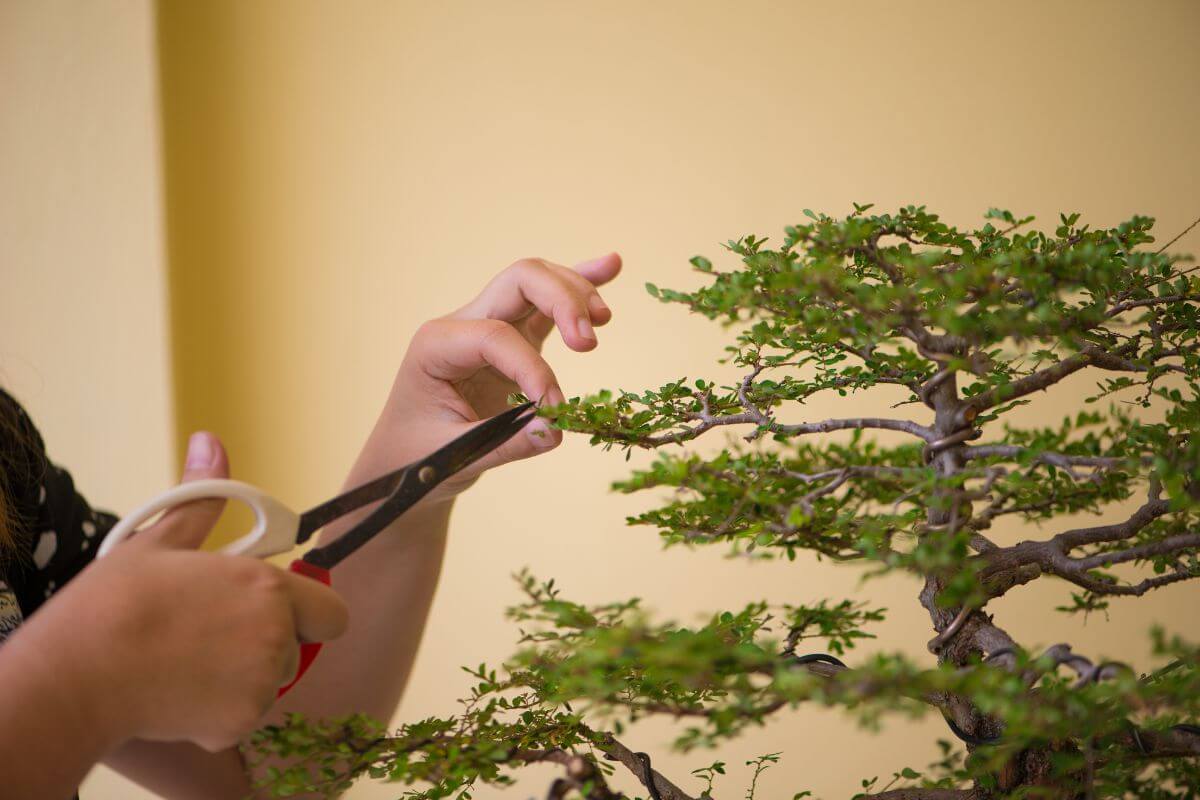
When buying bonsai tools, reliability should be the top priority for any bonsai tree owner. You need to feel confident that you will be able to achieve what you set out to do, regardless of brand name or price.
This buying guide will help those wondering how to choose bonsai scissors.
Bonsai Scissor Sizes
Bonsai Scissors are available in various sizes and measured in millimeters (mm). Here’s a guide to choosing the right bonsai scissors based on size and purpose:
Bonsai scissor purpose:
- 200mm (8 inches) – Commonly used for general pruning, suitable for small to medium-sized branches. Versatile but avoid using on very thick branches to prevent blade damage.
- 180mm (7 inches) – Ideal for delicate tasks and tight spaces. Best for small bonsai trees or intricate trimming work.
- 210mm (8.25 inches) – Offers more reach and handles thicker branches while still allowing for precise cuts. Good for larger bonsai trees.
Choosing the right size:
- Tree Size – Match the scissors to the size of your bonsai tree. Smaller trees need smaller scissors, while larger trees require longer, sturdier ones.
- Branch Thickness – Use larger scissors for thicker branches. For very thick branches, switch to branch cutters.
- Foliage Density – For tightly packed foliage, use smaller, delicate scissors to avoid damaging other branches.
Bonsai Scissor Types
Besides their size, scissors come in various types for different pruning, care, and maintenance tasks. While you could get by with just one type, using the right scissors for each job makes pruning easier and keeps your tools in good shape. Misusing scissors can lead to damage, so it’s best to use each type as intended.
1. Concave Cutters
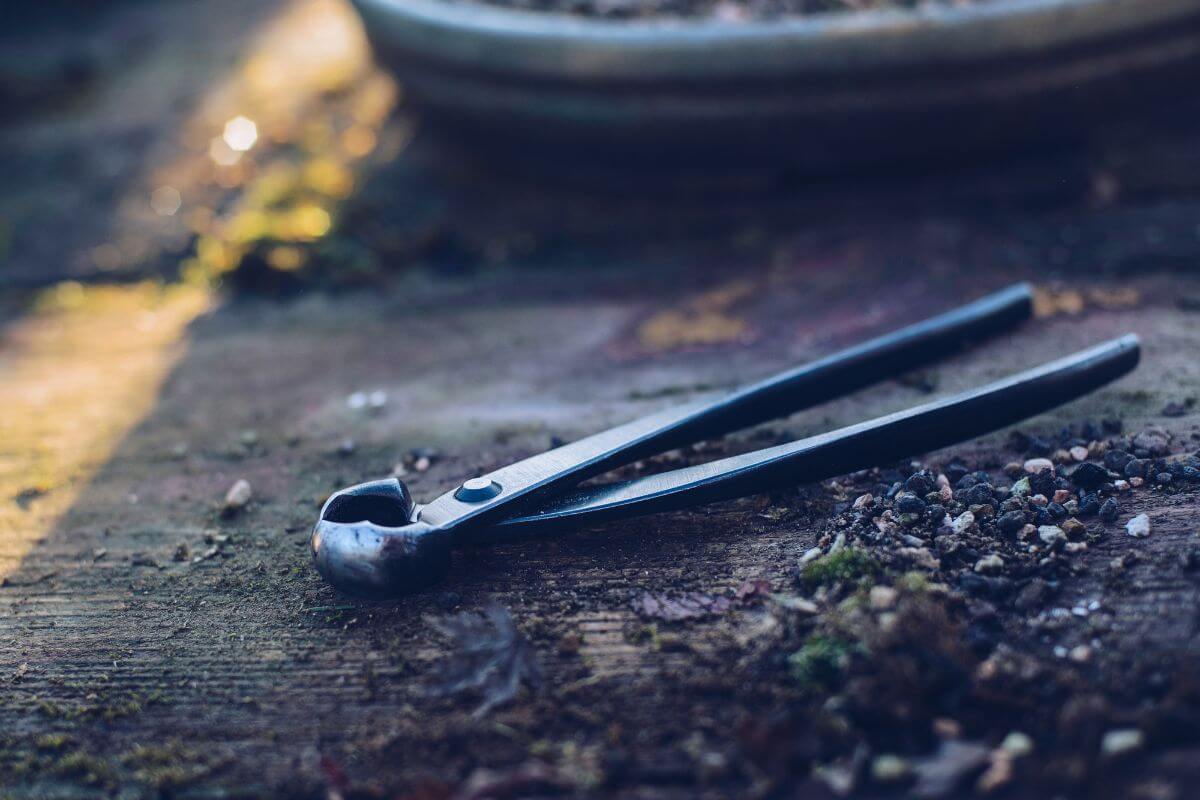
Concave cutters are essential for bonsai care, designed specifically for branch removal. They have curved blades that make clean, concave cuts, leaving a shallow depression that heals quickly and reduces visible scars.
Available in sizes like 7-inch (180mm) and 8-inch (200mm), they are versatile for cutting branches up to half the blade length. These tools are ideal for achieving a smooth finish on the trunk, promoting faster healing, and maintaining the tree’s health.
2. De-Candling Scissors
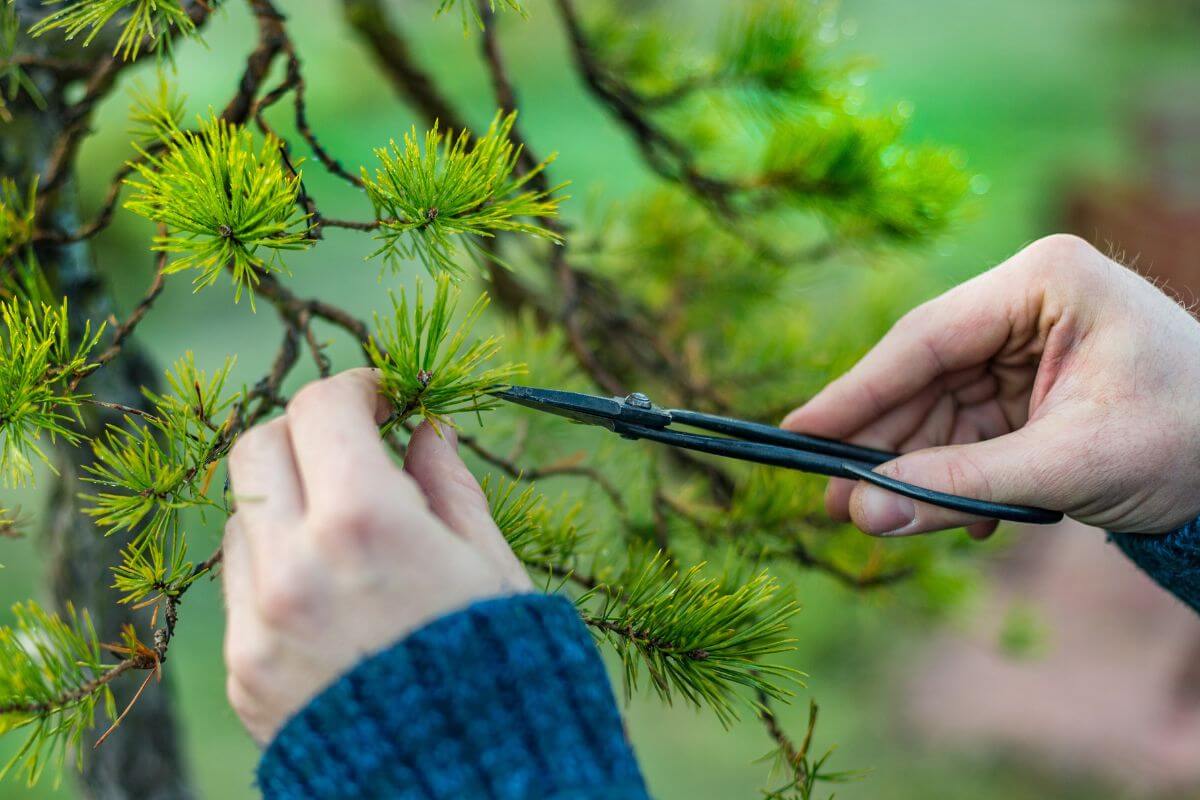
De-candling scissors are perfect for precision work on pines and densely branched trees. With long, slender handles and fine blades, they allow easy access to remove new growth (candles) without damaging surrounding foliage.
This tool is especially useful for black and red pines, where careful trimming is essential. Their design also helps maintain compact tree shapes and fine twigging, making them invaluable for detailed bonsai maintenance.
3. Bud Shears
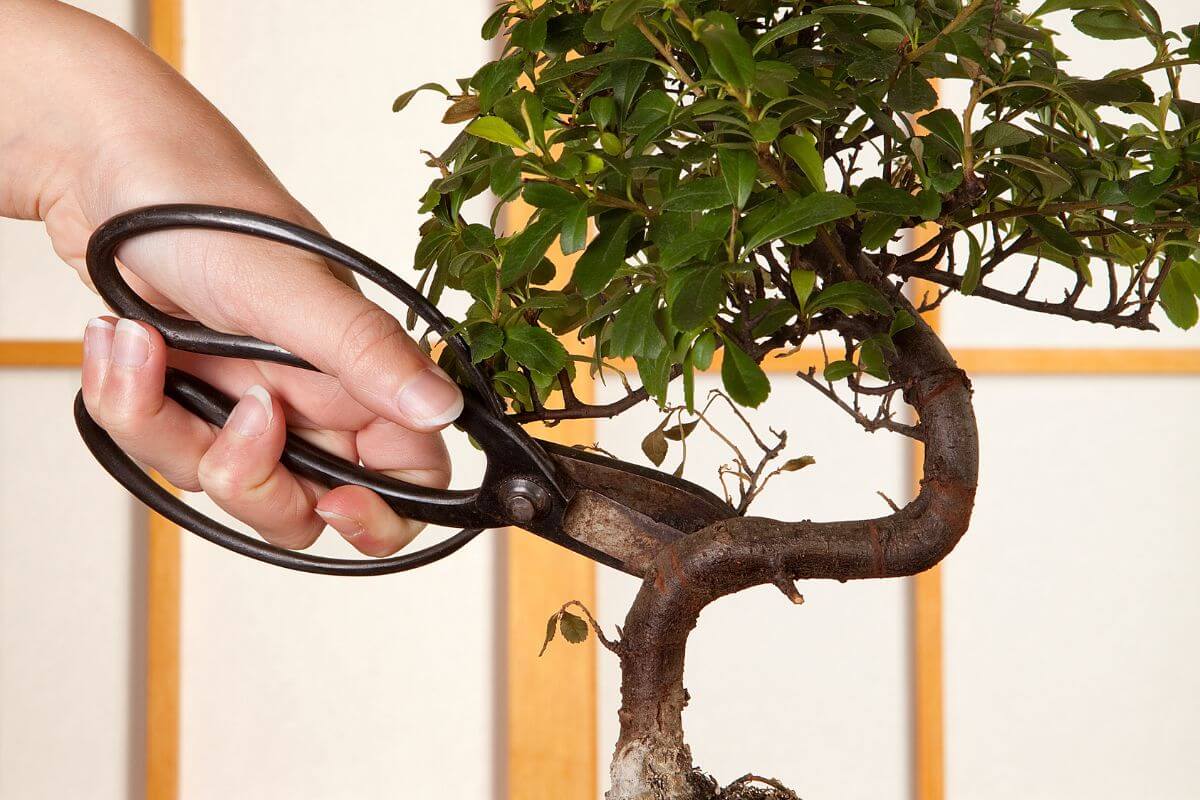
Bud shears are among the smallest bonsai scissors, designed for meticulous work. They are used to remove unwanted buds and trim very fine twigging on highly ramified trees.
Their compact size allows for precise cutting in tight spaces without damaging delicate branches. Ideal for miniature bonsai and intricate areas within the tree’s canopy, bud shears are crucial for detailed refinement and maintaining the tree’s overall appearance.
4. Root Scissors
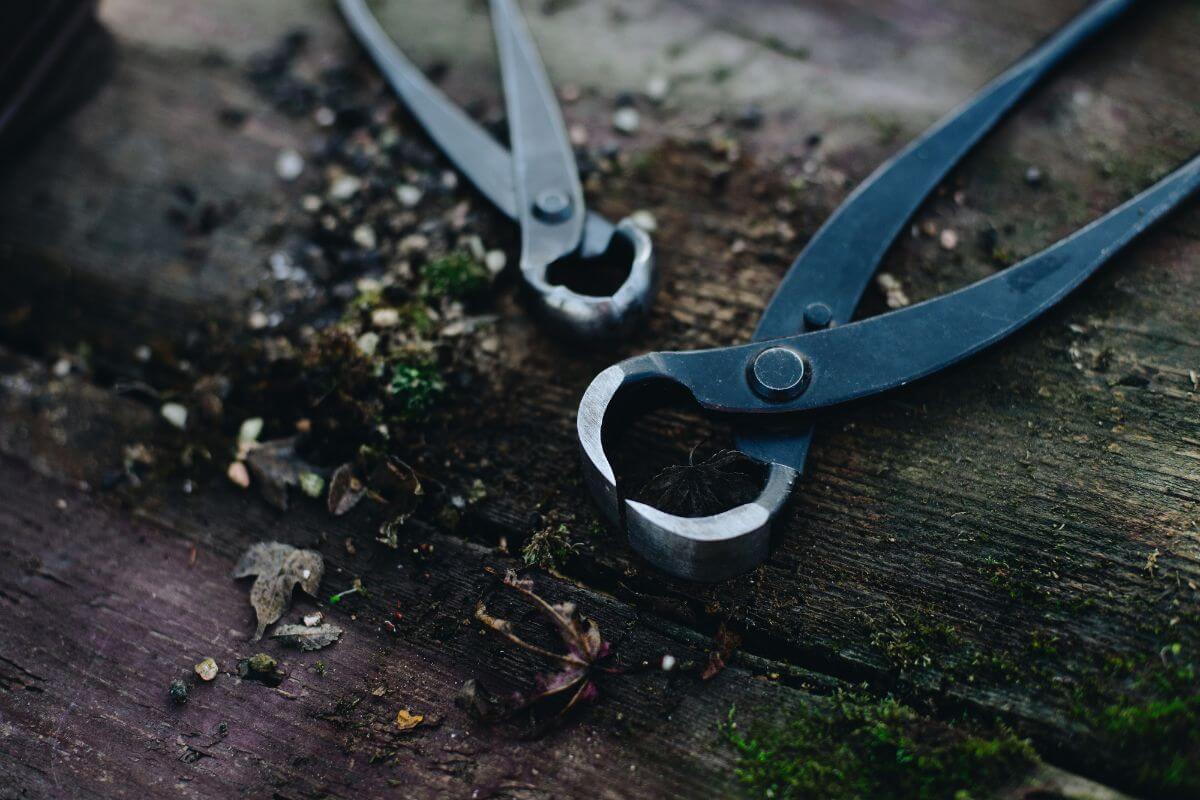
Root scissors are specialized for handling root work in bonsai. They feature shorter, robust blades that can cut through tougher root material, including small rocks and inorganic soil components.
They are important for repotting and root pruning, these scissors make precise cuts without harming the delicate root structure. Their durability sets them apart from regular pruning scissors, allowing them to manage dense root balls and woody roots effectively.
Should You Go for Stainless Steel or Carbon Steel Bonsai Scissors?
Bonsai tools come mainly in two types: stainless steel and carbon steel. Japanese stainless steel bonsai tools are famous for their top-notch quality. But don’t worry, carbon steel tools are a great choice too.
Stainless steel tools have a big plus: they don’t rust, which means they’ll last a long time. However, they do need sharpening more often than carbon steel tools. On the flip side, carbon steel tools stay sharp longer because they’re hard.
Here’s a quick comparison to help you decide:
| Tool Type | Advantages | Disadvantages |
|---|---|---|
| Stainless Steel | Rust-resistant, so they last longer. | Need sharpening more often. Generally more expensive. |
| Carbon Steel | Stay sharp longer, so you sharpen them less. | Cheaper but can rust over time, especially with high carbon content. Requires good care to prevent rust. |
Choosing between them depends on your budget and how much maintenance you’re ready for. Both types can serve you well in your bonsai gardening journey.
Are Bonsai Scissors Cheap or Expensive?
Cheap bonsai scissors range from $10 to $30. Often mass-produced with lower-quality steel, they may be adequate for beginners but tend to dull quickly and may not provide clean cuts.
Mid-range scissors, costing between $30 and $100, offer better quality and durability. These are usually made with higher-grade steel and provide sharper, more precise cuts.
High-end bonsai scissors can cost from $100 to several thousand dollars. The most expensive pair, crafted by Yasuhiro Hirakawa, is priced at $32,000. These premium tools are handmade by skilled artisans using top-quality materials like Japanese blue steel.
For most enthusiasts, scissors priced between $40 and $200 offer a good balance of quality and affordability. They provide excellent performance and durability without the extreme cost of collector-grade tools.
Bonsai Scissors Final Thoughts
Choosing the right bonsai scissors is key to shaping your tree. Good tools make a big difference.
Using dull or wrong scissors can hurt your bonsai and mess up the scissors too. The right tools are a must for the best care.
When you have the right scissors, you’ll see how well you can shape your bonsai.
Bonsai Scissors FAQs
1. Do You Need Special Scissors for Bonsai Trees?
Yes, special bonsai scissors are recommended for pruning bonsai trees. They are designed to handle the delicate branches of bonsai trees more effectively than regular scissors. Made from stainless steel, bonsai scissors come in various sizes and types to suit different pruning needs.
2. How Much Are Bonsai Scissors?
Bonsai scissors typically range from $10 to $50. Prices vary based on size, shape, and craftsmanship. High-end scissors can cost significantly more, with the most expensive pair priced at $35,000.
3. How Do You Use a Bonsai Concave Cutter?
To use a bonsai concave cutter, first remove old bark with a knife. Position the cutter perpendicular to the trunk, then pull the handles to make a concave cut. This technique helps create clean cuts that heal quickly.
4. Why Are Pruning Shears Better Than Scissors?
Pruning shears are sharper than regular scissors, allowing for cleaner cuts on branches. They minimize damage and scars on the tree compared to scissors, making them more effective for removing dead wood and maintaining tree health.
5. Can I Use Regular Scissors to Trim Plants?
Regular scissors can be used for trimming plants, but they are not ideal. They may cause damage and sap bleeding if used improperly. Investing in bonsai scissors is better for precise and healthy pruning.
6. What Is a Bonsai Knob Cutter?
A bonsai knob cutter is used to trim larger cuts and remove branch stubs. It creates concave cuts that heal quickly and cleanly, helping to maintain a healthy tree. This tool is ideal for removing old branches and encouraging new growth.
Learn more about bonsai trees with these articles:








